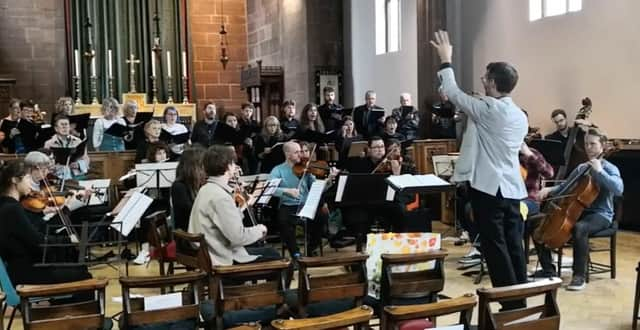The Glasgow Bach Cantata Project: Michael Bawtree on a very ambitious concert series


“They’re like a complete encyclopaedia of music, forms and instruments.” Conductor, choral director and organist Michael Bawtree is talking about one of the cornerstones of the choral music repertoire: JS Bach’s cantatas. They’re not as grand (or as long) as the composer’s Passions or B minor Mass, and frankly, far less well known. But there are more than 200 of them. And, together with fellow conductor and choral director Frikki Walker, Bawtree intends to bring them all to Glasgow, in performances by local Glasgow musicians, in a project that’s planned to span the next – well, several years, almost certainly.
It’s a hugely ambitious undertaking, but one with huge rewards, too, for both performers and listeners. And it’s a labour of love, too: musicians donate their time and expertise for free, and all proceeds from the concert series go to charity – in the project’s first year, the Glasgow City Mission.
Advertisement
Hide AdAdvertisement
Hide AdBach wrote the cantatas across several decades in the early 1700s, mainly for the two Leipzig churches where he was music director, at the astonishing rate of one a week for Sunday services, plus extras for any special church occasions. They’re primarily religious works (apart from a few less serious-minded “secular” cantatas), but whether you’re a believer or not, they contain some of his most glorious music.
How have co-music directors Bawtree and Walker gone about recruiting the project’s performers? “We put out a call on social media,” explains Bawtree, “for anybody who wanted to be involved. And we had a huge immediate response, about 120 people.” From which, he explains, they now have a pool of performers from which they can draw as needed – depending on the specific performing forces that particular cantatas require.
“It’s a joyous combination of performers – some professional musicians who are volunteering their services, and some players from the Royal Conservatoire of Scotland and Glasgow University who are getting a chance to perform music they wouldn’t normally play. We already knew quite a few of the musicians who got in touch from the Glasgow music scene. But there were others that none of us had ever heard of.” It’s been gratifying to discover new Glasgow musicians, Bawtree says. “But we want people to keep getting in touch if they’d like to be involved – that way, the pool will forever refresh itself.”
But these are far more than scratch performances. A high level of playing ability is expected. That said, there’s also a turn-up-and-get-on-with-it spirit to the whole thing. “We need to know that people have practised the music themselves,” says Bawtree, “so that when they arrive for rehearsals on the performance day, they hit the ground running – which they did fantastically at our first concert, back in June.”
Indeed, the project kicked off with an inaugural event on 26 June at St Bride’s, Hindland. “We just didn’t know how things were going to work out,” admits Bawtree, “but it was extraordinary. I think everyone felt at the end of the first concert: wow, what an achievement.”
The cantatas return to St Bride’s for the project’s third concert (on 13 November), following its second, on 25 September at St Margaret’s Church, Newlands. “Glasgow has a plethora of beautiful performance spaces,” says Bawtree, “and we hope to use as many of them as we can during the course of the project, right across the city.” With performances being planned on a rolling basis, watch this space for further updates.
The Glasgow Bach Cantata Project is an example of a community music project in the best sense, bringing together local musicians for high-level performances, and providing an opportunity to experience this glorious music – as either performer or listener – in all its richness and variety. And even if you can’t play or sing, there are still opportunities to lend a hand. “People should just get in touch and let us know what they’ve done before – even stewarding, stage managing or other things behind the scenes. We’re always looking for a good crew!”
For more information about future Glasgow Bach Cantatas Project concerts or to get involved, visit www.glasgowbach.com